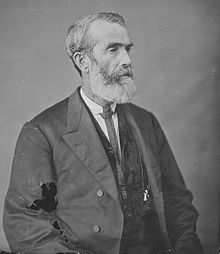James Mullins (American politician)
| James Mullins | |
|---|---|
 |
|
| Member of the U.S. House of Representatives from Tennessee's 4th district |
|
|
In office March 4, 1867 – March 3, 1869 |
|
| Preceded by | Edmund Cooper |
| Succeeded by | Lewis Tillman |
| Member of the Tennessee House of Representatives | |
|
In office 1865-1867 |
|
| Personal details | |
| Born |
September 15, 1807 Bedford County, Tennessee, United States |
| Died | June 26, 1873 (aged 65) Shelbyville, Tennessee |
| Resting place | Arnold Cemetery Shelbyville, Tennessee |
| Political party | Republican |
| Profession | millwright, politician |
James Mullins (September 15, 1807 – June 26, 1873) was an American politician who represented Tennessee's 4th congressional district in the United States House of Representatives from 1867 to 1869. He also served a single term in the Tennessee House of Representatives (1865–1867). Described as a "fierce fanatic of the Republican Party," Mullins supported the initiatives of Governor William G. Brownlow in the state legislature, most notably leading efforts to ratify the Fourteenth Amendment.
Mullins opposed Southern secession at the outbreak of the Civil War, and served in the Union Army as an advisor to General William Rosecrans during the war.
Mullins was born at "Three Forks of the Duck River" in Bedford County, Tennessee, on September 15, 1807. He initially worked as a farmer, but gradually turned to the milling business. By the outbreak of the Civil War, he had become a successful millwright, and owned several slaves. He was appointed a colonel in the Tennessee state militia in 1831, and served as Sheriff of Bedford County from 1840 to 1846. In 1843, he petitioned the state government for tax relief for Bedford County.
Mullins was originally a member of the Whig Party. After that party's dissolution in the mid-1850s, he aligned with the nativist American Party ("Know Nothings"), and was a member of the Bedford County delegation at Tennessee's American Party conventions in Nashville in February 1856 and February 1857 (his fellow Bedford Countian, William H. Wisener, was president of the latter convention). By the late 1850s, Mullins had thrown his support behind the Opposition Party, a hodgepodge group of ex-Whigs, ex-Know Nothings, and disgruntled Democrats formed to counter the rising secessionist sentiments championed by Southern Democrats. Mullins represented Bedford at the state's Opposition Party conventions in March 1859 and February 1860.
...
Wikipedia
